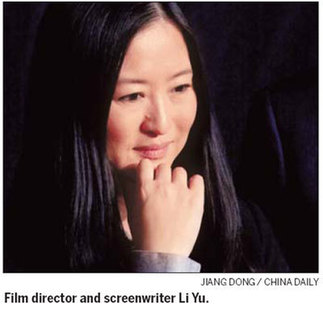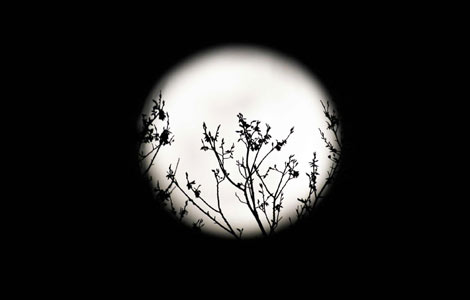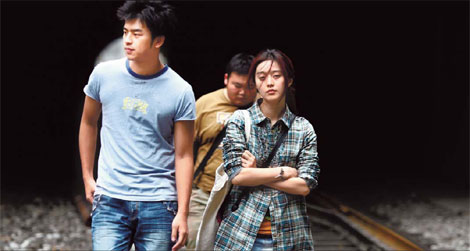Movie
No ifs or buts
Updated: 2011-03-08 07:56
By Liu Wei (China Daily)
|
A scene from director Li Yu's new film Buddha Mountain. Provided to China Daily |
Two years after Lost in Beijing was pulled out of theaters, Li Yu is confident her fourth film Buddha Mountain will touch audiences. Liu Wei reports.
I felt lost, says film director and screenwriter Li Yu about how she felt when her last film, Lost in Beijing, was pulled out of theaters in 2008. "I could not understand it then," she says. "I love making films and do it with sincerity. I felt trapped and wondered why it was so hard."
The film, portraying a foot masseuse's entangled relationship with her boss and her window-washer husband, was withdrawn from theaters one month after its premiere, with the authorities accusing the filmmakers of screening an unapproved version, with sexually explicit scenes, at the Berlin Film Festival, and spreading it on the Internet.
Li made no films for the next two years, spending her time reading novels and philosophy books - the former, she says, for possible film stories and the latter to ease her inner turmoil.
A recurring dream she had then was of being on the set, only to find there was no camera. In her dreams she would ask her cinematographer anxiously: "Where is the camera?"
 |
One day, while wandering the streets, she saw a man with his garbage cart on which he had written a Chinese homonym for "Porsche". A small sound box, placed next to the garbage can, had disco music blaring from it.
Looking at him she suddenly began to question why she had withdrawn into a shell.
"I have to face the reality, since I want to make films here," she says. "China is in an era full of stories! Some (filmmakers) choose to go underground, making films only for international festivals, but I want my audience, including people like that garbage collector, to see my films."
She finally found her story - one that could survive the censors as well as touch the audience - and turned it into the film Buddha Mountain, which premiered on March 4.
The story revolves around a middle-aged woman mourning her son's death in a car accident and her three 20-something boarders who have left their homes to escape tense relationships with their parents.
Although they clash over lifestyles and values, they gradually forge a bond, learning from one another about love and responsibility.
If Lost in Beijing was a sharp knife, Buddha Mountain is a warm poem.
"I am less furious and more tolerant," Li says. "You could say that without Lost in Beijing there would not have been a Buddha Mountain."
Li says her script was greatly inspired by an Internet blog by Feng Xiang, a man who had lost his eight-year-old son in the catastrophic earthquake of 2008 in Sichuan. After devoting almost one year to rebuilding his town, Feng committed suicide.
In his last blog entry he wrote: "If I died, my son, I would be the happiest. Your mother would bury me beside you under a tree."
Buddha Mountain explores how people see their lives, whether they are middle-aged and trapped in miserable memories, or youngsters confused about the future.
"Life may seem hard at first, but appears beautiful if you change your point of view. To some, even the loss of it could appear beautiful," Li says.
Sun Jiayu, chief editor of Cinema World magazine, has called the film "real and vivacious".
"When Chinese directors are showing China as a cluster of metropolises, making mainland and Hong Kong stars fly above the roofs, Li Yu presents a contemporary China, the daily lives of ordinary people, and their pain, joy and faith," he writes.
Of the film's characters, Li, 38, identifies most strongly with pub singer Nanfeng, one of the three youngsters. In the film, she scares a hooligan who bullies her friend by striking her own head with a beer bottle. She is brave, audacious and never plans for the future.
"She never says 'if', and I hate saying the word myself," Li says. "If I think about too many 'ifs' I could never make films."
Li had a comfortable life as a TV anchor in her hometown Jinan in East China, but boredom forced her to leave for Beijing.
"My boss threw a bunch of 'ifs' at me then. He said if I went to Beijing, nobody would care about me even if I was hit by a car," she laughs. "But I just did not want to see a fixed future."
In her early days in Beijing, she directed Oriental Horizon, a popular TV show featuring news and short documentaries about the lives of common people.
That experience proved invaluable. She readily recalls those stories, such as the one about a girl who hated being seen as the older sister to her twin brother, insisting they were born at the same time; a psychiatrist who was adored by his patients but could not convince his daughter he was not a liar; and a professor who was convinced children of farmers needed to have their IQ tested.
"I got to see different aspects of Chinese society," she says. "At a time of huge social changes, there are bound to be all kinds of appealing stories."
Soon, she began to feel the limitations of the documentary format. She felt feature films would allow for a freer expression.
In 2001 she made her first film, Fish and Elephant, which was based on the story of a lesbian couple she met as a documentary filmmaker. Back then she did not even know she would have to obtain approval from the State Film Bureau before she started filming, or the film would never make it to the theaters.
Her second film Dam Street about a young single mother won Li the Golden Lotus at the Deauville Asian Film Festival in 2006, although it did not do well at the box office.
Then came Lost in Beijing, which brought her fame but also frustrations. She still cherishes the film, calling it flawed but valuable.
Although her film career has been uneven, Li does not like to talk about her setbacks.
"I dislike directors who complain," she says. "They do not lead a life that is much harder than that of vendors or cleaners. At least I am doing something I like.
"Besides, things are getting better. We talk with officials about our ideas. Some of them really understand films and help us the best they can. I have chosen to stay, so I accept everything that comes with that."
Buddha Mountain won the awards for Best Artistic Contribution and Best Actress at the 2010 Tokyo International Film Festival.
E-paper

City of Joy
Welcome to the 'world of smiles' where life meanders slowly.
Preview of the coming issue
Debate on nuclear power revived
The future is now
Specials

Beloved polar bear died
Berlin's beloved polar bear Knut, an international star died Saturday.

Panic buying of salt
Worried Chinese shoppers stripped stores of salt on radiation fears.

'Super moon'
The "Super Moon" arrives at its closest point to the Earth in 2011.

